Mon 15 Nov 2021
A Movie Review by David Friend: SLEEPING CAR TO TRIESTE (1948).
Posted by Steve under Mystery movies , Reviews[8] Comments
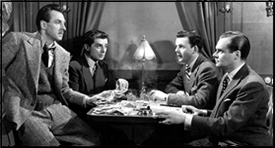
SLEEPING CAR TO TRIESTE. General Film Distributors, UK, 1948. Eagle Lion Films, US, 1949. Jean Kent, Albert Lieven, Derrick De Marney, Paul Dupuis, Rona Anderson. Screenplay: Allan MacKinnon . Director: John Paddy Carstairs. Currently available on YouTube.
I’ve always loved films set on vintage trains. It’s the best place to generate suspense: strangers trapped together with no safe way to escape. The Lady Vanishes (1938), of course, is the gold standard, though Night Train to Munich (1940), The Narrow Margin (1952) are other notables. This effort from prolific British director John Paddy Carstairs is a remake of 1932’s Rome Express, which I’ve seen, and follows it fairly faithfully.
That film centred on a Van Dyke painting stolen by a gang of thieves who subsequently fail to regroup. Poole, one of the gang, tries to flee on the Compagnie Internationale des Wagons-Lits train the Rome Express, travelling between Paris and Rome, but his accomplice Zurta, gets on board himself in pursuit.
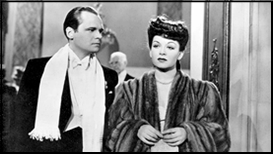
Also on board are an adulterous couple, an English golf-bore, a wealthy but tight-fisted businessman and his brow-beaten secretary/valet, a French police officer and an American film star with her manager/publicist.
The 1948 version went out under the title Sleeping Car to Trieste. The train is now the Orient Express, though the story’s biggest difference is probably the MacGuffin: instead of a painting, it’s now a diary. The film star has also disappeared, the businessman is now a celebrated writer and the golf-bore (who had been played rather wonderfully by Gordon Harker) is now a hooray henry, while other characters have been added.
As in the original, when Poole (Alan Wheatley – who I only saw the other day in a Tara King-era Avengers episode) boards a train in an attempt to flee his accomplices, one of them, Zurta (Albert Lieven), gets on board and tries to catch him. The tension comes from watching how close he gets. Of course, Poole tries to lay low in his compartment (the sleeping car of the title) until he gets to the West, where he can sell the diary without sharing the proceeds with his accomplices.
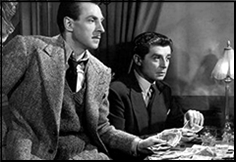
Unfortunately, he is interrupted by another passenger who insists on sharing his accomplice. The diary is hastily hidden in the en-suite bathroom and Poole tries to arrange another compartment for himself without raising too much attention. Before long, he is roaming the train alone and trying to find cover while avoiding bumping into Zurta.
Elsewhere on the train, there is an adulterous couple (Derek De Marney and Rona Anderson) an Italian-American GI from New York (Bonar Colleano); a famous writer and his put-upon valet Finlay Currie and Hugh Burden); an ornithologist (Michael Ward); a French police inspector (Paul Dupuis) and an imbecilic stockbroker (David Tomlinson).
The tone is much lighter than the more sinister Rome Express. There is a French chef who is forced to take lessons on English food from a cheerfully xenophobic passenger (“…And that’s called roly poly pudding!â€) while the American GI, bored senseless by the chattering ornithologist sharing his compartment, has his romantic advances spurned by a couple of young French sisters (“We don’t want to be liberated anymore!â€).
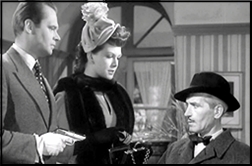
Tomlinson’s character – younger than his Rome Express counterpart – is perhaps the most overtly humorous, as he bumps into the couple and realises he knows the man, George Grant, and insists on spending time with him. Grant, therefore, must keep away from his mistress, Joan, to avoid their affair becoming known.
There’s a neat bit of satire here, perhaps even pathos, as Joan is more in love with him than he is with her. In fact, Grant is clearly using Joan as a bit of sexual distraction during his business trip, and deserves all the trouble he gets. Similar sympathy is wrought by author Alastair MacBain’s poor valet Mills who – in one of the film’s most engaging scenes – briefly turns the tables on his tyrannical employer.
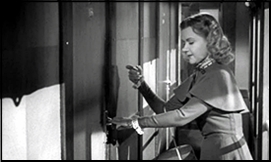
Although such scenes are diverting, they do distract from the main plot, particularly as these side-characters never become properly involved in it. I expected the diary to go from passenger to passenger but, although it does get discovered, this doesn’t quite happen.
There is still tension, however, not least when Poole is cajoled into a card game involving Zurta and tries to avoid being left alone with him, and there’s a murder in the last couple of reels, followed by a confrontational climax.
The film is neatly updated to the late 1940s political situation in Europe, though this is only ever obliquely referred to. Aside from the first five minutes, the whole thing is set on the train, so railfans and retro-romantics will enjoy seeing the compartments and corridors. Like the first version, it lacks a central protagonist, and there’s no larger conspiracy to unravel, but on its own terms, it is worth a watch.
Rating: ***

November 15th, 2021 at 9:55 pm
As it so happens, this movie has been reviewed twice before on this blog:
Here by David Vineyard:
https://mysteryfile.com/blog/?p=43357
And here by Mike Tooney:
https://mysteryfile.com/blog/?p=31717
November 16th, 2021 at 8:11 am
What an engaging review! The kind of thing that makes me want to go out and watch it today.
November 16th, 2021 at 10:09 am
That is my kind of film. I always like the way train films have a unique kind of spatial signature …everyone and everything is compressed into those strict, rectangular dimensions. Visually succinct.
Especially nifty on those European trains was how the corridors were on the outside where the windows are, and compartments arranged in a line down the middle. It’s wonderful.
And I also like how a train story itself follows the ‘structure’ of the trip. From boarding to disembarking. It all lodges itself very firmly in the mind.
Now, the players. I’m unfamiliar with most of these stars except for Alan Wheatley. For some reason I know that name.
November 16th, 2021 at 11:07 am
Alan Wheatley played the Sherriff of Nottingham on the Adventures of Robin Hood tv series.
November 16th, 2021 at 8:34 pm
I love train books and movies. Both the mysteries. And the Buster Keaton type comedies.
This film is a new one to me. Thank you!
I come by this train-love honestly. My grandfather drove a train in Chicago.
November 16th, 2021 at 9:53 pm
An entertaining film with an unusual sinister role for Finlay Currie, who was more often cast in roles like the father of Robert Taylor’s IVANHOE, Cary Grant’s faithful manservant and friend in PEOPLE WILL TALK, or the scientist being forced to defect by Soviet agents in WALK EAST ON BEACON STREET.
Like many of you I love books on trains. In the Seventies I rode on the Orient Express, sadly before the restoration when it was not quite what it had once been, but still romantic and quite luxurious. Luckily no one was murdered on my trip and there was no crime unless someone got their pocket picked before leaving Paris.
De Marney is better known here for two roles, the murderous UNCLE SILAS opposite Jean Simmons in THE INHERITANCE based of Le Fanu’s classic novel and as Slim Callaghan in MEET MR. CALLAGHAN on stage and screen based on Peter Cheyney’s books.
The original film benefits from the presence of Conrad Veidt.
I haven’t read it yet, but I just found a mystery novel by director John Paddy Carstairs I will likely review if it is any good or absolutely terrible (anything in between doesn’t serve much purpose at this point).
November 16th, 2021 at 10:01 pm
It might be as well to note screenwriter Allan MacKinnon aka Roger MacDougal is one of the best British adventure writers in the tradition of Victor Canning, Geoffrey Household, and Hammond Innes.
Books include HOUSE OF SAND, MAP OF MISTRUST, and CORMORANT’S ISLE. Other screenplays include THIS MAN IS NEWS, 10 DAYS IN PARIS, and THE SAINT’S GIRL FRIDAY.
November 16th, 2021 at 11:30 pm
Growing up in Chicago: Oh, Leary?